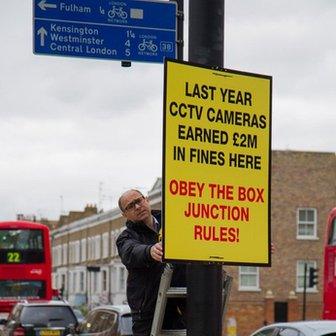CCTV road fines: Tackling traffic or raising money?
- Published
Adam Shaw reports
A growing number of councils want to use CCTV to catch more drivers breaking traffic laws. They say the move will ease congestion but drivers say they are being unfairly penalised to raise money.
I am driving on the road to nowhere - seeing how easy it is to pick up motoring fines on the way.
I am investigating how motorists are struggling with complex road signs and whether they are being used as cash cows by councils who are making millions of pounds from traffic fines.
For every three cars that were on the road 20 years ago, there are now four.
As traffic gets worse, councils are seeking new ways of fining motorists by using CCTV.
I start my journey sitting in a traffic jam on the way to Basildon, Essex.
Here the council has turned an entire road into a bus lane and can fine motorists at any time.
But although buses do not run on a Sunday, cars can still not drive down this road.
The council says it would review these times if the local community supported it.
'Nonsense' allegations
Around the country, bus lanes are the new battleground for drivers.
Some councils in England now fine three times as many drivers as they did five years ago.
In London, you can be fined £130 for a traffic offence whereas outside the capital the top levy is £70.
Reading Borough Council tops the table for bus lane tickets so I drive to meet a councillor whose portfolio includes highways.
"This allegation that somehow we put in cameras to raise money is nonsense," said Tony Page.
"We put in cameras so that buses... run on time and the bus lanes do what they say."
Bristol City Council can also fine drivers for entering bus lanes but a transport service for the disabled is unhappy with how the rules are being enforced.
The council allows a minibus into its bus lanes but not a van carrying people in wheelchairs, so they have to sit in the queue or the company risks a fine.
"For the last two years we've paid about £400 in fines and in fact in the last two months, we've paid £90 in three fines," said Martyn Hancock of Disabled Travel Service.
Bristol and Reading councils are significant as they are part of a group of 20 authorities outside London who want to gain extra enforcement powers to fine motorists for offences like stopping in box junctions and ignoring no-right-turn signs.
Councils in the capital already have those powers and that is where I am heading next.
Hotspots
In London, it is time for me to test my driving skills in one of the nation's ticketing hotspots.
I head for the Bagley's Lane box junction in Fulham, which is nicknamed the "money box".
More than 29,000 motorists were fined here in the year to March, yielding £2m for Hammersmith and Fulham Council.
I give myself a pep talk as I approach it, revisiting my Highway Code.
You're not allowed stop in a box junction if it blocks traffic.
If your exit road is not clear, you must not enter in the first place.
There is one exception - if you are turning right and the only thing stopping you getting out of the box is oncoming traffic.
As I am careful to abide by the rules, the other drivers around me see red.
I refuse to creep into the box junction and I am shouted at and beeped as other commuters desperately try to move ahead.
After resident Andrew Ashe got a ticket, he submitted a Freedom of Information request, forcing the council to reveal email exchanges in their traffic department.
There were emails that highlighted talk of financial targets rather than of improving traffic flow.
"Another record for us," read one email.
"The late shift penalty charge notices helped matters so well done everyone," read another.

Adam Shaw putting up a sign to warn motorists
In fact, there is even an internal email which appears to show council frustration that drivers are obeying the law because that would mean fewer fines and less money for the council.
"A worrying start as penalty charge notices seemed to reduce," said the email.
Hammersmith and Fulham Council said the remarks from the internal emails represented "office banter" which did not demonstrate a culture of revenue-raising.
The council said it was committed to reducing the number of tickets at the Bagley's Lane box junction.
A sign saviour?
I decided to give the council a helping hand. I stood on the side of the road and counted the number of vehicles getting stuck in the junction during rush hour.
I got a ladder out, climbed a lamp-post and put up a couple of signs warning people about the junction.
After we put our signs up, there was a 25% drop in the number of cars getting stuck in the junction.
Our signs, it appeared, were working - but I thought I had better alert the authorities.
Despite the fact that the signs seemed to make drivers obey the rules, Hammersmith and Fulham told me to take the signs down.
There is no easy answer to the increasing congestion on our roads.
But one thing became clear on my road trip. Councils around the country are seeking the enforcement powers already used in London, and that will mean extra revenue for them in a tough economic climate.
New CCTV-enforced traffic fines could be coming to a council near you.